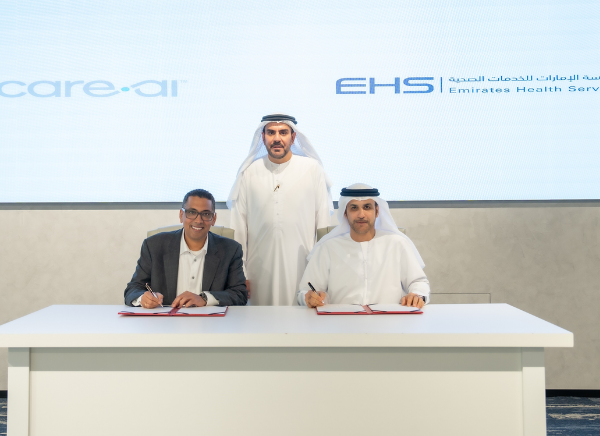
In a significant development, Dr. Mohammad Salim Al Olama, Chairman of the Board of Directors of Emirates Health Services (EHS), presided over the signing of a memorandum of understanding (MoU) between EHS and Care.AI. The primary objective of this MoU is to leverage Generative AI technology to bolster patient room monitoring systems, thereby elevating the standards of healthcare services in alignment with the government’s strategic priorities and EHS goals.
Dr. Yousif Mohammed Al Serkal, Director General of EHS, and Chakri Toleti, CEO of Care.AI, inked the MoU in the presence of key figures including Mubarak Ibrahim, Acting Executive Director of the Information Sector at EHS, and Dr. Zahid Al Sabti, CEO of Magenta Investments, along with several representatives from both organizations.
The MoU sets the stage for robust strategic collaborations aimed at harnessing Generative AI and implementing the Care.AI system across EHS healthcare facilities. This implementation will span various healthcare departments, including emergency departments, operating rooms, intensive care units, neonatal units, and more, all geared towards enhancing patient care.
The Care.AI platform will play a pivotal role in patient classification based on diverse parameters, such as mental well-being and infection prevention, while also providing vital support to medical staff for swift responses and adherence to patient care protocols. Furthermore, the system will facilitate comprehensive clinical decision-making, streamlining workflow procedures, enhancing productivity, and ensuring superior patient experiences.
Notably, the platform will automate routine administrative tasks, significantly boosting professionals’ efficiency through real-time data tracking and monitoring.
Dr. Mohammed Al Olama emphasized that this partnership signifies a milestone in deploying Generative AI technologies within the healthcare sector. He stated, “This partnership with CARE.AI will enhance patient monitoring and ensure the provision of safe and efficient healthcare services.” He underscored EHS’s commitment to fulfilling strategic objectives, aligning with national priorities, and achieving the goals of ‘We the UAE 2031’ and the UAE Centennial Plan 2071.
Dr. Yousif Mohammed Al Serkal added, “This agreement is a milestone in further strengthening the healthcare sector of the UAE by enhancing the quality of life of individuals through proactive, integrated, and sustainable healthcare services using advanced Generative AI technologies.” He emphasized the importance of enhancing the quality of life and customer experiences to establish EHS as a leading healthcare provider nationally and globally.
The agreement encompasses the deployment of Generative AI solutions across all EHS healthcare facilities, covering operating rooms, intensive care units, neonatal units, and other critical departments. The platform will vigilantly monitor patients’ mental well-being, prevent and control infections, and uphold hygiene standards in line with international benchmarks. It will also empower healthcare professionals to respond promptly to patient needs while adhering to protocols, ultimately leading to better patient outcomes.
The memorandum also includes the provision of Care.AI’s Smart Care Facility Platform, which amalgamates data from ambient sensors, biometric devices, and electronic health records (EHR) to offer insights into patients’ historical health trends, current conditions, ongoing protocols, and potential issues. This wealth of data enables the AI system to predict health episodes and provide actionable recommendations to clinical teams.
Harnessing generative AI, the system is poised to suggest innovative patient care strategies, improve processes, and enhance workflows based on accumulated data over time. The platform also incorporates virtual care support, introducing new models for an enhanced patient experience.
Furthermore, the Care.AI solutions encompass a range of services, including Fall Prevention, Pressure Injury Avoidance, Automated Natural Language Processing, Self-Harm Prevention, AI-assisted Triage for the Emergency Department, Streamlined Patient Flow, Equipment Tracking, Patient Safety Monitoring, and Inventory Tracking for the Operating Room, AI-Assisted Virtual Nursing, Virtual Precepting & Mentorship, Virtual Specialist Visits, Virtual Consults, Virtual Sitting, Virtual Case Management.
The Patient Room Control System places paramount importance on patient data privacy and security, aligning with EHS policies, state ICT laws, and cybersecurity standards. It ensures the confidentiality and protection of patient information while delivering state-of-the-art healthcare services.